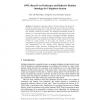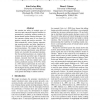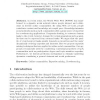1541 search results - page 23 / 309 » Predicting user interests from contextual information |
114
Voted
CIKM
2007
Springer
15 years 8 months ago
2007
Springer
Traditional adaptive filtering systems learn the user’s interests in a rather simple way – words from relevant documents are favored in the query model, while words from irre...
114
click to vote
OTM
2005
Springer
15 years 7 months ago
2005
Springer
In ubiquitous computing, behavior routine learning is the process of mining the context-aware data to find interesting rules on the user’s behavior, while preference learning tri...
126
click to vote
NAACL
2004
15 years 3 months ago
2004
We examine the utility of multiple types of turn-level and contextual linguistic features for automatically predicting student emotions in human-human spoken tutoring dialogues. W...
108
click to vote
CORR
2006
Springer
15 years 1 months ago
2006
Springer
We investigate here concept learning from incomplete examples. Our first purpose is to discuss to what extent logical learning settings have to be modified in order to cope with da...
201
click to vote
ADBIS
2011
Springer
14 years 1 months ago
2011
Springer
Abstract. In recent years, the World Wide Web (WWW) has transformed to a gigantic social network where people interact and collaborate in diverse online communities. By using Web 2...



